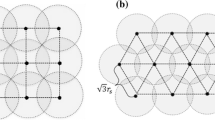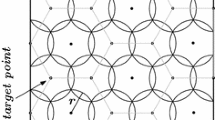Abstract
Self-organized wireless sensor networks are ad-hoc networks containing a large number of energy-constrained sensors. Reducing energy consumption and prolonging network lifetime is one of the most important design challenges in wireless sensor network. In this paper, a decentralized node scheduling algorithm is proposed to keep a minimal necessary number of sensors active while maintaining networking connectivity and sensing coverage. Experimental results show that our algorithm outperforms the PEAS algorithm and the sponsor area based algorithm with respect to the number of working sensors needed.
Access this chapter
Tax calculation will be finalised at checkout
Purchases are for personal use only
Preview
Unable to display preview. Download preview PDF.
Similar content being viewed by others
References
Shih, E., Cho, S., Ickes, N., Min, R., Sinha, A., Wang, A., Chandrakasan, A.: Physical layer driven protocol and algorithm design for energy-efficient wireless sensor networks. In: Proc. of MobiCom 2001, Rome, Italy (July 2001)
Ye, F., Zhong, G., Lu, S., Zhang, L.: Peas: A robust energy conserving protocol for long-lived sensor networks. In: Proc. of the 23nd ICDCS (2003)
Tian, D., Georganas, N.D.: A Coverage-Preserving Node Scheduling Scheme for Large Wireless Sensor Networt. In: Proc. of WSNA 2002, Atlanta, Geogia, USA (2002)
Zhang, H., Hou, J.C.: Maitaining Sensing Coverage and Connectivity in Large Sensor Networks. Technical Report. UIUCDCS-R-200302351. UIUC (June 2003)
Akyildiz, I.F., Su, W., Sankarasubramaniam, Y., Cayirci, E.: Wireless Sensor Networks: A Survey. Computer Networks (March 2002)
Kahn, J.M., Katz, R.H., Pister, K.S.J.: Next century challenges: Mobile networking for Smart dust? In: Proc. of of MobiCom 1999, Washington (August 1999)
Slijepcevic, S., Potkonjak, M.: Power Efficient Organization of Wireless Sensor Networks. In: Proc. of ICC 2001, Helsinki, Finland (June 2001)
Nasipuri, A., Li, K.: A Directionality based Location Discovery Scheme forWireless Sensor Network. In: Proc. of WSNA 2002, Atlanta, Georgia, USA, September 28 (2002)
Huang, C.-F., Tseng, Y.-C.: The Coverage Problem in a Wireless Sensor Network. In: Proc. of WSNA 2003, San Diego, California, USA, September 19 (2003)
Elson, J., Romer, K.: Wireless Sensor Networks: A New Regime for Time Synchronization. ACM Mobile Computing and Communication Review (MC2R) 6(4), 59–61 (2002)
Author information
Authors and Affiliations
Editor information
Editors and Affiliations
Rights and permissions
Copyright information
© 2004 Springer-Verlag Berlin Heidelberg
About this paper
Cite this paper
Jiang, J., Dou, W. (2004). A Coverage-Preserving Node Scheduling Algorithm for Self-organized Wireless Sensor Networks. In: Jin, H., Pan, Y., Xiao, N., Sun, J. (eds) Grid and Cooperative Computing - GCC 2004 Workshops. GCC 2004. Lecture Notes in Computer Science, vol 3252. Springer, Berlin, Heidelberg. https://doi.org/10.1007/978-3-540-30207-0_73
Download citation
DOI: https://doi.org/10.1007/978-3-540-30207-0_73
Publisher Name: Springer, Berlin, Heidelberg
Print ISBN: 978-3-540-23578-1
Online ISBN: 978-3-540-30207-0
eBook Packages: Springer Book Archive




